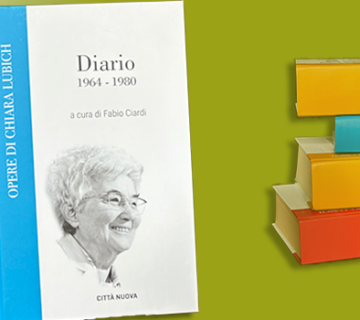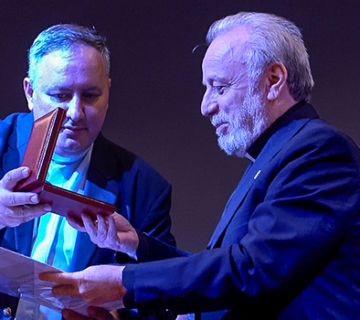 “I will show you the way of wisdom” is DePaul University’s motto and it shows up here and there on its campus. The university was founded at the end of the 19th century by the Congregation of the Mission of St. Vincent de Paul, with the goal of providing proper education to the children of Catholic immigrants to Chicago. Today it has 25 thousand students and it has been ranked among the “top tier” universities in the United States.
“I will show you the way of wisdom” is DePaul University’s motto and it shows up here and there on its campus. The university was founded at the end of the 19th century by the Congregation of the Mission of St. Vincent de Paul, with the goal of providing proper education to the children of Catholic immigrants to Chicago. Today it has 25 thousand students and it has been ranked among the “top tier” universities in the United States.
The motto, taken from the Book of Proverbs, acquired a special meaning during World Catholicism Week organized by the university, the first day of which was dedicated to the theme “Catholic spirituality: a global communion”. Various personalities spoke during the week. On that first day, April 11, a number of roundtable discussions took place, some simultaneously, and some scholars from the Focolare Movement were called to present various aspects of the communal dimension of the spirituality of Chiara Lubich. Dr Judith Povilus presented the interdisciplinary, multi-ethnic and intercultural experience of the University Sophia in Loppiano. Dr Donald Mitchell discussed the connection between environmentalism and interreligious dialogue; and Dr Paul O’Hara discussed the Marian dimension of the Church.
Maria Voce, finally, gave a talk with the title “Spirituality and Trinitarian Theology in the Life and Thought of Chiara Lubich”. In a room full of academic personalities and representatives of the Catholic world, the Focolare’s president underlined four aspects of the spirituality of communion: God-love, love for our neighbour, mutual love, and Jesus Forsaken as key to the achievement of unity. She dwelled in particular on the mystery of Jesus Forsaken viewed as a secret way to heal all wounds caused by division and fragmentation.
 Maria Voce used Chiara Lubich’s experience of light in the summer of 1949 and her intuitions about the spirituality of communion as mirror of the life of the Trinity as a reference point for some passages of Chiara’s she read to the audience. At the end she underlined the deep agreement between the spirituality of communion and the ideas expressed in John Paul II’s apostolic letter Novo Millennio Inuente, and presented the challenge of Sophia University, which aims at “providing foundations and perspectives of global learning, of a culture that springs from the charism of unity and that is the fruit of communitarian spirituality lived deeply as a mirror of the life of the Trinity.”
Maria Voce used Chiara Lubich’s experience of light in the summer of 1949 and her intuitions about the spirituality of communion as mirror of the life of the Trinity as a reference point for some passages of Chiara’s she read to the audience. At the end she underlined the deep agreement between the spirituality of communion and the ideas expressed in John Paul II’s apostolic letter Novo Millennio Inuente, and presented the challenge of Sophia University, which aims at “providing foundations and perspectives of global learning, of a culture that springs from the charism of unity and that is the fruit of communitarian spirituality lived deeply as a mirror of the life of the Trinity.”
 Two theologians, Dr Tom Norris of the International Theological Commission and Dr David Schindler, director of the John Paul II Institute for Studies on Marriage and Family at the Catholic University of America responded to Maria Voce. Both emphasized, albeit from different perspectives, the contemporary relevance of Chiara Lubich’s Trinitarian thought and the courage contained in her proposal to the Church and to today’s theological thinking. Norris mentioned that a theologian recently claimed that the Trinity is the grammar of every theology. Schindler highlighted the Marian dimension of Chiara’s communitarian spirituality and her capacity to respond in a positive manner to the Enlightenment.
Two theologians, Dr Tom Norris of the International Theological Commission and Dr David Schindler, director of the John Paul II Institute for Studies on Marriage and Family at the Catholic University of America responded to Maria Voce. Both emphasized, albeit from different perspectives, the contemporary relevance of Chiara Lubich’s Trinitarian thought and the courage contained in her proposal to the Church and to today’s theological thinking. Norris mentioned that a theologian recently claimed that the Trinity is the grammar of every theology. Schindler highlighted the Marian dimension of Chiara’s communitarian spirituality and her capacity to respond in a positive manner to the Enlightenment.
It was impossible at that end of that day not to think of the connection between the “way of wisdom” proposed by DePaul University to its students and Chiara Lubich’s charism of communion, a gift from God to walk better on the way to wisdom.
Roberto Catalano


 Italiano
Italiano Español
Español Français
Français Português
Português


